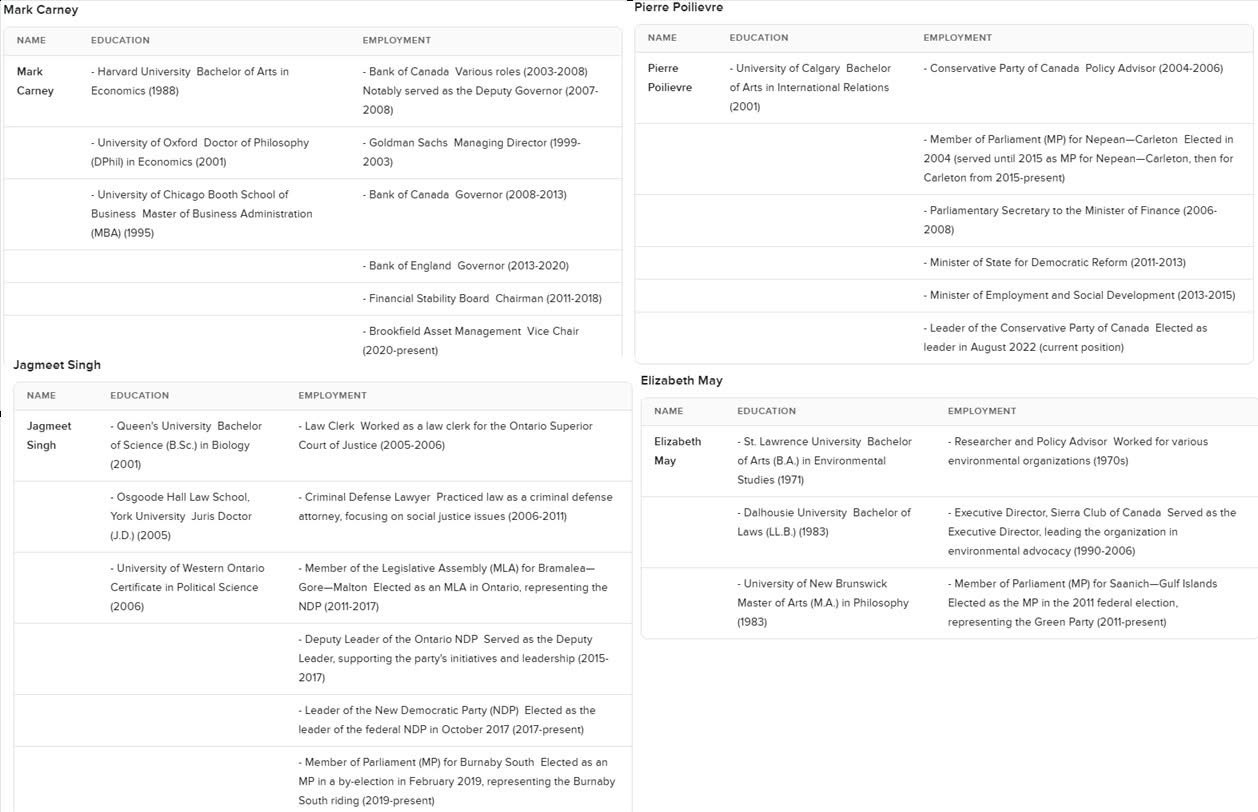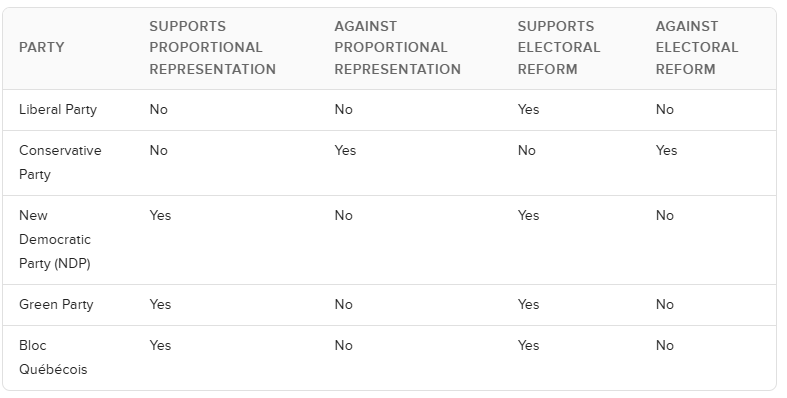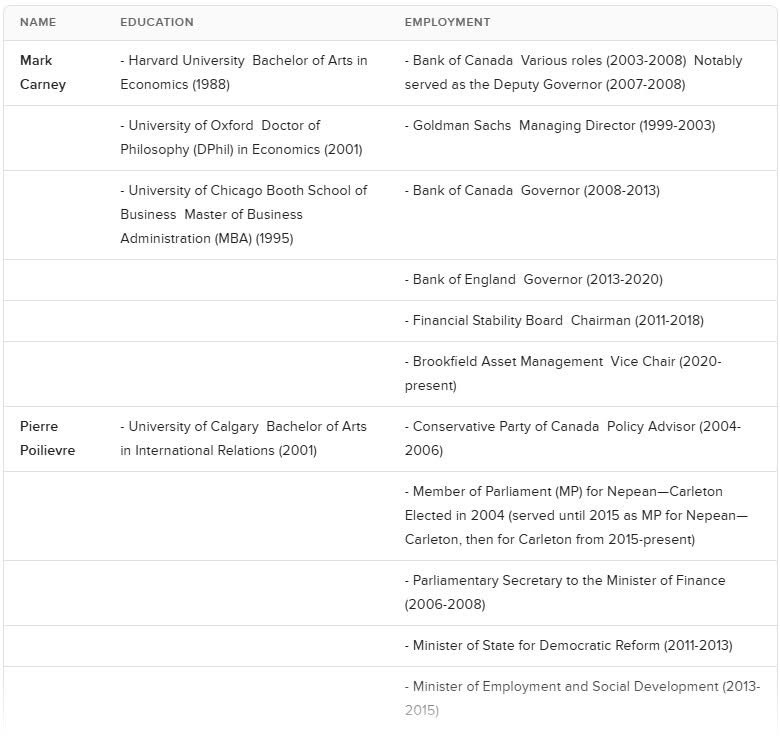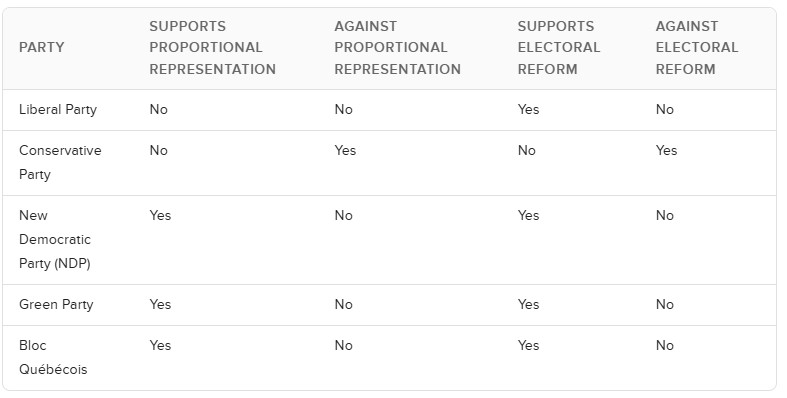Liberal Party The Liberal Party has historically supported electoral reform, particularly during the 2015 election when they promised to replace the first-past-the-post system. However, after forming the government, they decided not to pursue a change to the electoral system, citing a lack of consensus among Canadians. They have since focused on other democratic reforms but have not committed to implementing proportional representation. Conservative Party The Conservative Party generally opposes proportional representation, favoring the current first-past-the-post electoral system. They argue that the existing system provides stable government and clear accountability. The party has expressed concerns that proportional representation could lead to fragmented parliaments and unstable coalitions. New Democratic Party (NDP) The NDP strongly supports electoral reform and advocates for a proportional representation system. They believe that such a system would better reflect the diversity of Canadian voters and ensure that every vote counts. The NDP has consistently included electoral reform in their platforms and calls for a national referendum on the issue. Green Party The Green Party is a strong proponent of proportional representation and has made it a central part of their platform. They argue that a proportional system would lead to a more representative and democratic government. The Green Party has consistently advocated for electoral reform and aims to implement a system that reflects the popular vote. Bloc Québécois The Bloc Québécois supports electoral reform and advocates for a proportional representation system. They argue that such a system would better represent the interests of Quebec and ensure that all votes are counted fairly. The party has called for reforms to enhance democratic representation in Canada.
RebelSquare42
I agree, PR is one of my prime issues and i generally vote for the party with the strongest support of it.
Sure, here:
Mark Carney
Education: Harvard University Bachelor of Arts in Economics (1988) University of Oxford Doctor of Philosophy (DPhil) in Economics (2001) University of Chicago Booth School of Business Master of Business Administration (MBA) (1995)
Employment: Bank of Canada Various roles (2003-2008) Notably served as the Deputy Governor (2007-2008) Goldman Sachs Managing Director (1999-2003) Bank of Canada Governor (2008-2013) Bank of England Governor (2013-2020) Financial Stability Board Chairman (2011-2018) Brookfield Asset Management Vice Chair (2020-present)
Pierre Poilievre
Education: University of Calgary Bachelor of Arts in International Relations (2001)
Employment: Conservative Party of Canada Policy Advisor (2004-2006) Member of Parliament (MP) for Nepean—Carleton Elected in 2004 (served until 2015 as MP for Nepean—Carleton, then for Carleton from 2015-present) Parliamentary Secretary to the Minister of Finance (2006-2008) Minister of State for Democratic Reform (2011-2013) Minister of Employment and Social Development (2013-2015) Leader of the Conservative Party of Canada Elected as leader in August 2022 (current position)
Jagmeet Singh
Education: Queen's University (Kingston, Ontario) Degree: Bachelor of Science (B.Sc.) in Biology Year: Graduated in 2001 Osgoode Hall Law School, York University (Toronto, Ontario) Degree: Juris Doctor (J.D.) Year: Graduated in 2005 University of Western Ontario (London, Ontario) Certification: Certificate in Political Science Year: Completed in 2006
Employment: Law Clerk (2005-2006) Worked as a law clerk for the Ontario Superior Court of Justice. Criminal Defense Lawyer (2006-2011) Practiced law as a criminal defense attorney, focusing on social justice issues. Member of the Legislative Assembly (MLA) for Bramalea—Gore—Malton (2011-2017) Elected as an MLA in Ontario, representing the NDP. Deputy Leader of the Ontario NDP (2015-2017) Served as the Deputy Leader, supporting the party's initiatives and leadership. Leader of the New Democratic Party (NDP) (2017-present) Elected as the leader of the federal NDP in October 2017. Member of Parliament (MP) for Burnaby South (2019-present) Elected as an MP in a by-election in February 2019, representing the Burnaby South riding.
Elizabeth May
Education: St. Lawrence University (Canton, New York, USA) Degree: Bachelor of Arts (B.A.) in Environmental Studies Year: Graduated in 1971 Dalhousie University (Halifax, Nova Scotia, Canada) Degree: Bachelor of Laws (LL.B.) Year: Graduated in 1983 University of New Brunswick (Fredericton, New Brunswick, Canada) Degree: Master of Arts (M.A.) in Philosophy Year: Completed in 1983
Employment: Researcher and Policy Advisor (1970s) Worked as a researcher and policy advisor for various environmental organizations. Executive Director, Sierra Club of Canada (1990-2006) Served as the Executive Director, leading the organization in environmental advocacy. Member of Parliament (MP) for Saanich—Gulf Islands (2011-present) Elected as the MP in the 2011 federal election, representing the Green Party. Leader of the Green Party of Canada (2006-2019, re-elected in 2022) Initially served as the leader from 2006 to 2019 and was re-elected as leader in November 2022. Author and Speaker (Various years) Engaged in writing and public speaking on environmental issues and policy.
 added JS and EM
added JS and EM
There is a distinct lack of terror or injury to civilians in these scenarios. certainly criminal destruction of property but I'd like to see some first hand accounts of the personal terror, injury or threat of injury to civilians these acts are causing: Terrorism : noun The use of violence or the threat of violence, especially against civilians, in the pursuit of political goals. The act of terrorizing, or state of being terrorized; a mode of government by terror or intimidation. The practise of coercing governments to accede to political demands by committing violence on civilian targets; any similar use of violence to achieve goals.
Wow if that’s how upset he is over a potential minor emotional trauma for his child I wonder how he would feel about her living in Ukraine under bombings?




I don’t think it’s clear that he didn’t have a job before, the other candidates also seem to Only have listings of their formal careers in their adult life… but it’s worth digging. My first job as a teenager was roofing and I can say that summer was so hard it built a work ethic in me so all subsequent jobs were ‘easy’ by comparison.. the jobs you have in your formative years really can shape you for a lifetime.